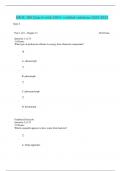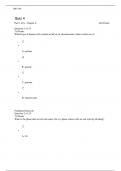Biol 180 - Study guides, Class notes & Summaries
Looking for the best study guides, study notes and summaries about Biol 180? On this page you'll find 127 study documents about Biol 180.
All 127 results
Sort by
BIOL 180 Quiz 6-with 100% verified solutions-2023-2024
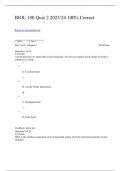
-
BIOL 180 Quiz 2 2023/24 100% Correct
- Exam (elaborations) • 23 pages • 2023
- Available in package deal
-
- $15.49
- + learn more
BIOL 180 Quiz 2 2023/24 100% CorrectBIOL 180 Quiz 2 2023/24 100% Correct Return to Assessment List Part 1 of 5 - Chapter 2 42.0 Points Question 1 of 33 3.0 Points A bond between two atoms that occurs frequently, but does not require much energy to break is referred to as what? • A. Covalent bond • B. van der Waals Interactions • C. Hydrogen bond • D. Ionic bond Feedback: Great job. Question 2 of 33 3.0 Points What is the smallest component of...
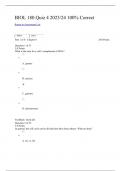
-
BIOL 180 Quiz 4 2023/24 100% Correct
- Exam (elaborations) • 22 pages • 2023
- Available in package deal
-
- $17.99
- + learn more
BIOL 180 Quiz 4 2023/24 100% CorrectBIOL 180 Quiz 4 2023/24 100% Correct Return to Assessment List Part 1 of 6 - Chapter 6 24.0 Points Question 1 of 33 3.0 Points What is the term for a cell’s complement of DNA? • A. gamete • B. nucleus • C. genome • D. chromosome Feedback: Great job. Question 2 of 33 3.0 Points In general, the cell cycle can be divided into three basic phases. What are they? • A. G1, S, G2 • B. prophase, anaphas...
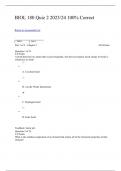
-
BIOL 180 Quiz 2 2023/24 100% Correct
- Exam (elaborations) • 23 pages • 2023
- Available in package deal
-
- $17.99
- + learn more
BIOL 180 Quiz 2 2023/24 100% CorrectBIOL 180 Quiz 2 2023/24 100% Correct Return to Assessment List Part 1 of 5 - Chapter 2 42.0 Points Question 1 of 33 3.0 Points A bond between two atoms that occurs frequently, but does not require much energy to break is referred to as what? • A. Covalent bond • B. van der Waals Interactions • C. Hydrogen bond • D. Ionic bond Feedback: Great job. Question 2 of 33 3.0 Points What is the smallest component of...
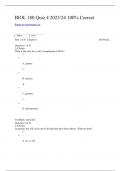
-
BIOL 180 Quiz 4 2023/24 100% Correct
- Exam (elaborations) • 22 pages • 2023
- Available in package deal
-
- $17.99
- + learn more
BIOL 180 Quiz 4 2023/24 100% CorrectBIOL 180 Quiz 4 2023/24 100% Correct Return to Assessment List Part 1 of 6 - Chapter 6 24.0 Points Question 1 of 33 3.0 Points What is the term for a cell’s complement of DNA? • A. gamete • B. nucleus • C. genome • D. chromosome Feedback: Great job. Question 2 of 33 3.0 Points In general, the cell cycle can be divided into three basic phases. What are they? • A. G1, S, G2 • B. prophase, anaphas...
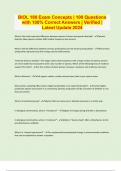
-
BIOL 180 Exam Concepts | 100 Questions with 100% Correct Answers | Verified | Latest Update 2024
- Exam (elaborations) • 12 pages • 2024
- Available in package deal
-
- $10.49
- + learn more
What is the most important difference between species richness and species diversity? - Species diversity takes species number AND relative frequency into account. What is the key difference between primary productivity and net primary productivity? - Net primary productivity represents just the energy used to build biomass. "Diversity leads to stability." This slogan claims that ecosystems with a large number of species present are more stable than ecosystems with a low number of species...
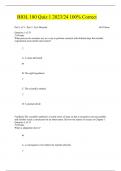
-
BIOL 180 Quiz 1 2023/24 100% Correct | Also Available in Package Deal
- Exam (elaborations) • 24 pages • 2023
- Available in package deal
-
- $15.99
- + learn more
BIOL 180 Quiz 1 2023/24 100% CorrectBIOL 180 Quiz 1 2023/24 100% Correct Part 1 of 5 - Part 1: Text Material 36.0 Points Question 1 of 33 3.0 Points What process do scientists use as a way to perform research with defined steps that include experiments and careful observation? • A. A clean lab bench • B. The right hypothesis • C. The scientific method • D. A journal article Feedback:The scientific method is a tested series of steps so that a resea...
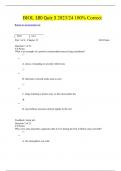
-
BIOL 180 Quiz 3 2023/24 100% Correct | also available on a package deal
- Exam (elaborations) • 22 pages • 2023
- Available in package deal
-
- $15.99
- + learn more
BIOL 180 Quiz 3 2023/24 100% CorrectBIOL 180 Quiz 3 2023/24 100% Correct Return to Assessment List Part 1 of 6 - Chapter 13 24.0 Points Question 1 of 33 3.0 Points What is an example of a positive relationship between fungi and plants? • A. decay of standing or recently felled trees • B. infection of stored seeds such as corn • C. fungi infecting a potato crop, so that most plants die • D. mycorrhizae increase nutrient uptake in the soil Feedback: Great...
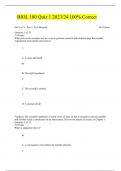
-
BIOL 180 Quiz 1 2023/24 100% Correct | Also Available in Package Deal
- Exam (elaborations) • 24 pages • 2023
- Available in package deal
-
- $15.99
- + learn more
BIOL 180 Quiz 1 2023/24 100% Correct | Also Available in Package DealBIOL 180 Quiz 1 2023/24 100% Correct Part 1 of 5 - Part 1: Text Material 36.0 Points Question 1 of 33 3.0 Points What process do scientists use as a way to perform research with defined steps that include experiments and careful observation? • A. A clean lab bench • B. The right hypothesis • C. The scientific method • D. A journal article Feedback:The scientific method is a teste...
BIOL 180 Quiz 4 APUS BIOL 180 Quiz 4 APUS BIOL 180 Quiz 4 APUS

Do you wonder why so many students wear nice clothes, have money to spare and enjoy tons of free time? Well, they sell on Stuvia! Imagine your study notes being downloaded a dozen times for $15 each. Every. Single. Day. Discover all about earning on Stuvia

